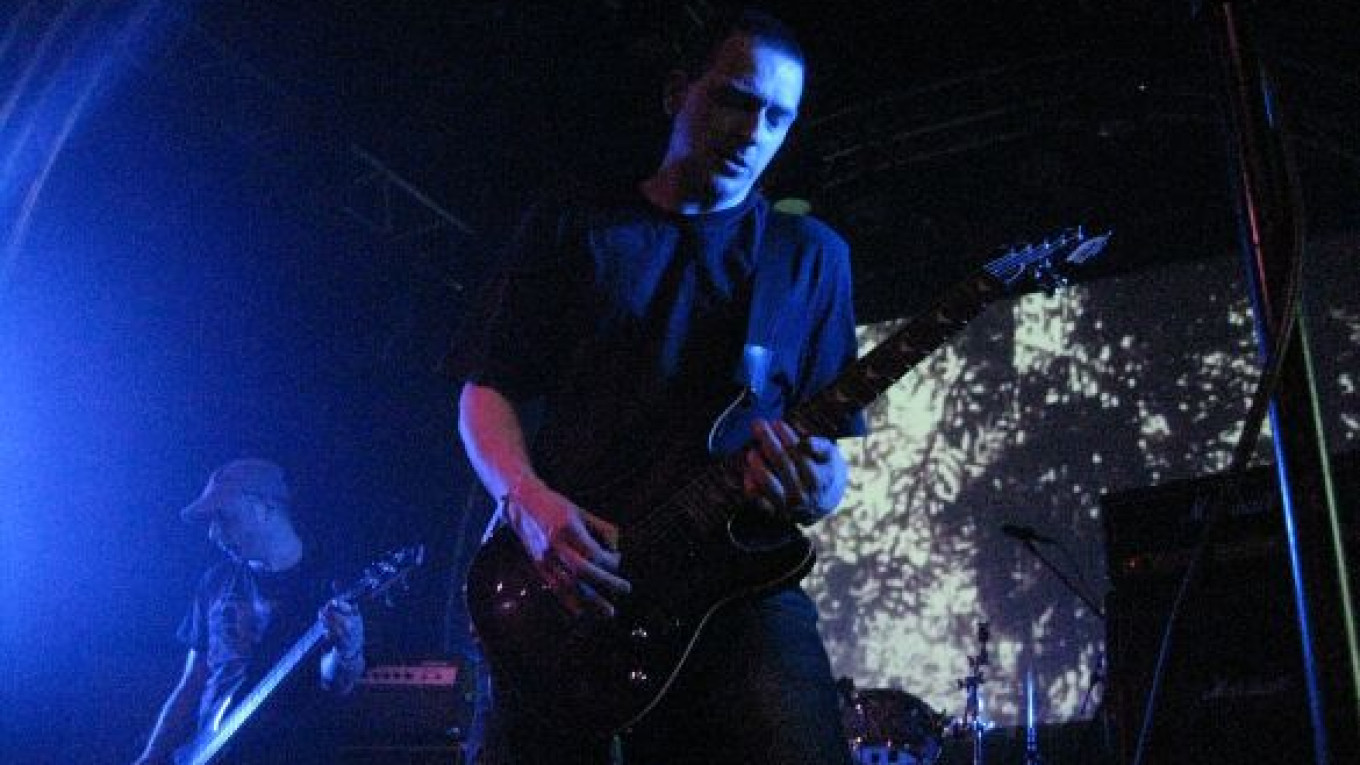The band Godflesh, pioneers of post-metal and industrial music, played their first-ever concert in Russia on Saturday to a packed crowd at Moscow Hall, headlining a bill of experimental metal bands.
The group recently began touring together again after a lengthy hiatus, and is readying their forthcoming album, A World Lit Only by Fire — named after William Manchester's 1992 informal history of the European Middle Ages — their first release since 2001's Hymns.
With a career that has spanned more than 20 years, the band from the central English city of Birmingham has made a significant impact on the history of extreme music, influencing the likes of Faith No More, Converge, Metallica and Ministry.
43-year old frontman Justin Broadrick began his career with Napalm Death and wrote and played guitar on Side A of their 1987 debut, Scum, the blueprint for countless grindcore bands to follow.
Known for their experimentation, Godflesh's music incorporates everything from electronic to dub music to make their uniquely slow, brooding, and brutal sound. Their debut album, Streetcleaner, a classic of the industrial metal genre and a core of their setlist on this tour, was released in 1989, and they went on to release another five albums before going on hiatus in 2002.
American duo Jucifer were the first opening act at Moscow Hall, a southern-rock influenced sludge metal act known for their extremely loud and heavy live performances. They played for 40 minutes straight without catching their breath, with guitarist Gazelle Amber Valentine on guitar, sharing vocal duties with her husband, drummer Edgar Livengood.
Next up were local industrial stalwarts, Sobaki Tabaka, who played their droney, low, atmospheric brand of avant-garde rock, reminiscent of Einstürzende Neubauten or early Swans.
Taking the stage at 10:15 p.m., Godflesh wasted no time in tearing into the pummeling, hypnotic and groove-heavy "Like Rats" from Streetcleaner, and continued with three more tracks from their debut album.
Though the stage was sparse, with only Green, Broadrick and a drum machine in the corner, the show was backed by impressive visuals of decaying urban landscapes and religious iconography, the perfect accompaniment to the music, whose subject matter often alluded to the grim side of the modern condition; of alienation, paranoia, nihilism, and spirituality.
Broadrick has previously explained that his music is a reflection of the environment he was brought up in, no doubt influenced by his experiences in the council estates in the gray and appropriately industrial landscape of Birmingham in the '80s.
The set list leaned heavily towards their early material, with the relentless blast of the drum machine providing the rhythm to Ben Green's powerful bass and Broadrick's guttural vocals.
Minor technical interruptions broke the flow of the concert several times, but a 10-minute break to address a faulty tuner and broken effects pedal served only to energize the crowd for the rest of the concert.
Godflesh finished their triumphant Russian debut with Crush My Soul, before returning to the stage shortly after for their encore, Slateman, off their 1991 EP, Slavestate, to the delight of fans who seemed thoroughly satisfied with the band's performance.
Ever the prolific frontman, Broadrick has maintained a large number of collaborative projects throughout his career, with over 50 releases under various guises.
He will return on 28 Sept. for another concert at Moscow Hall, this time fronting post-metal band Jesu. Their cult Russian fan-base will likely see to it that the venue is filled for what will be only be Broadrick's second ever appearance there.
Jesu will play Moscow Hall on Sept.28 at 11 p.m., 1 Triumfalnaya Ploschad, Metro Mayakovskaya.
Contact the author at artsreporter@imedia.ru
A Message from The Moscow Times:
Dear readers,
We are facing unprecedented challenges. Russia's Prosecutor General's Office has designated The Moscow Times as an "undesirable" organization, criminalizing our work and putting our staff at risk of prosecution. This follows our earlier unjust labeling as a "foreign agent."
These actions are direct attempts to silence independent journalism in Russia. The authorities claim our work "discredits the decisions of the Russian leadership." We see things differently: we strive to provide accurate, unbiased reporting on Russia.
We, the journalists of The Moscow Times, refuse to be silenced. But to continue our work, we need your help.
Your support, no matter how small, makes a world of difference. If you can, please support us monthly starting from just $2. It's quick to set up, and every contribution makes a significant impact.
By supporting The Moscow Times, you're defending open, independent journalism in the face of repression. Thank you for standing with us.
Remind me later.


